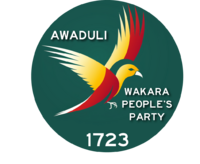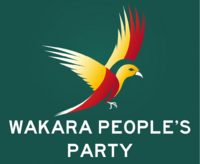Wakara People's Party 1723 General Election Campaign (Nouvelle Alexandrie)
  Campaign logo(s) for the Wakara People's Party 1723 general election campaign. | |
| Campaign Year | 1723 |
|---|---|
| Campaign Name | Awaduli 1723: Voices for Wakara Unity |
| Party Name | Wakara People's Party |
| Party Leader |
|
| Campaign Slogan | "One Land, Many Voices, United Future." |
| Campaign Launch Date | 1723 AN |
| Headquarters | Yabucoa, Boriquén |
| Political Alignment |
|
| Seats | 34 (Boriquén only) |
| Key Surrogates | |
| Amount of Events Held | XXX |
| Regions Visited | Boriquén |
Political Alignment
- Economic policy: -0.7
- The party advocates for cooperatives and shared ownership, indicating a left-leaning economic approach. Their plan proposes tax incentives for businesses that adopt environmentally sustainable practices.
- Social policy: -0.6
- The leaders emphasize grassroots movements and social accountability. The plan proposes the establishment of "Community Hubs" that integrate healthcare, education, and spiritual centers. Their focus on ethical and spiritual development suggests a liberal approach to social issues.
- Geographic tendency: 0.2
- The party has its roots in grassroots movements in Boriquén and promotes local faith and culture. However, they aim to balance urban and rural development, giving them a slightly rural inclination.
- Cultural tendency: -0.8
- The party leaders wear traditional Wakara attire and accessories, actively promote local culture through annual campaigns, and plan to include regional music in the educational curriculum. Their focus on spirituality and collective dialogue suggest a populistic tendency.
Overall, the Wakara People's Party appears to lean left economically and socially, with a slight rural inclination and a strong populistic cultural tendency. Their focus on cooperative economics, grassroots social engagement, and traditional culture indicates a comprehensive ideology that combines ancestral wisdom with modern policies.
Background
The Wakara People's Party was officially established in late 1722 AN, though its roots can be traced back to various grassroots organizations and community initiatives in Boriquén. Mayani Guacanagari and Beatriz Daguao, the party's inaugural leaders and independent Deputies of the Federal Assembly, were already prominent figures in community organizing and environmental activism before they turned to politics. The decision to form the party was catalyzed by a widely-publicized dispute over land rights in Yabucoa, which ended unfavorably for the Wakara indigenous communities. This incident compelled them to transition from advocacy to direct political action. In the first quarter of 1723 AN, the party organized "Awaduli Dialogues" — community town halls — in various regions of Boriquén. These events were designed to engage directly with the community, to identify their most pressing concerns, and to collaboratively develop policy proposals. In these dialogues, the themes of sustainable development, community governance, and cultural preservation consistently emerged as top priorities.
Planning for the general elections began in earnest in early 1723 AN, shortly after the Awaduli Dialogues concluded. A special committee named the "Election Readiness Team" was formed, composed of key party members, data analysts, and campaign strategists. They conducted a detailed electoral mapping exercise, identifying key constituencies where the party had significant support and others where awareness and engagement activities were needed. The Wakara People's Party entered into strategic alliances with various non-profit organizations and local businesses, especially those engaged in sustainable agriculture and renewable energy. These partnerships not only provided a vital financial boost to the campaign but also created a platform for greater community involvement. The feedback collected during the Awaduli Dialogues was compiled and synthesized into a formal policy draft. Legal experts and social scientists were consulted to ensure that the proposals were both innovative and feasible. The finalized platform was published in multiple formats, including a highly visual digital version designed to be accessible to young voters and those with limited political engagement.
To finance the campaign, the Wakara People's Party utilized a crowdfunding model, emphasizing small donations to avoid undue influence from large donors. They also sold campaign merchandise, such as buttons, T-shirts, and reusable bags, featuring artwork from local artists to further promote cultural unity. By mid 1723 AN, the party had exceeded its initial fundraising targets, enabling more comprehensive voter outreach initiatives.
A dedicated PR team managed the party's media strategy, regularly publishing updates, op-eds, and policy explainers in various news outlets. Social media was particularly leveraged to engage with younger voters. Mayani Guacanagari and Beatriz Daguao also participated in multiple televised interviews, gradually elevating the party's profile at the national level.
Involvement with the Lost Archives and Election Delays
The Wakara People's Party closely followed the unfolding events surrounding the Lost Archives of Nouvelle Alexandrie. Given the party's foundational focus on cultural preservation and heritage, the discovery of the archives resonated strongly with its members and voter base. They recognized the profound implications the Archives had for Nouvelle Alexandrian society, particularly in reconciling disparate historical narratives and fostering a unified national identity.
In alignment with the party's philosophy of deliberate and thoughtful action, the WPP supported the call initiated by the Federal Humanist Party for the delay of the New Alexandrian general election of 1723. Unlike some other parties that were eager to capitalize on the momentum generated by the discovery, the WPP argued that time was needed to fully comprehend the extent of the Archives' impact on the nation's future. To express this stance, the WPP launched a public awareness campaign through social media and community outreach. Party leaders Mayani Guacanagari and Beatriz Daguao penned op-eds in major publications, arguing that the Archives could offer irreplaceable insights into sustainable governance models, community values, and paths toward reconciliation between various cultural groups within Nouvelle Alexandrie. These discussions were strategically timed to coincide with the referendum.
Platform
The Wakara People's Party (WPP), founded by Mayani Guacanagari and Beatriz Daguao, is a political entity rooted in the ethos of the Wakara people. Through grassroots activism in "Voces de Boriquén" campaigns and a commitment to the Plan de Boriquén, we seek a more equitable, sustainable, and spiritually enriched society. While we are a regional party, the WPP aims to create meaningful change for all citizens of Nouvelle Alexandrie, with a special focus on the indigenous communities of Nouvelle Alexandrie and other marginalized communities.
National Defense
- Community Defense Forces: Establish Community Defense Forces (CDFs) as a supplemental security apparatus for special emergencies, natural disasters, insurrection, or invasions with emphasis on local issues and led by community members.
- Diplomatic Conflict Resolution: Use diplomatic avenues to resolve conflicts, emphasizing our traditional Wakara belief in dialogue and reconciliation.
Foreign Trade and Policy
- Sustainable Trade Agreements: Prioritize trade agreements that are not just economically advantageous but also environmentally and ethically responsible.
- Indigenous Partnerships: Strengthen partnerships with other indigenous communities worldwide for cultural and economic exchange.
- Wakara Cultural Diplomacy: Utilize Wakara culture, art, and spirituality as means of establishing goodwill and understanding on the global stage.
Environment
- Adoption of Renewable Energy: Meet 60% of the country’s energy needs through wind and solar power within the next decade.
- Water Conservation Policies: Institute policies that protect natural water sources and encourage sustainable use.
- Atabey Gardens: Establish Atabey Gardens throughout Nouvelle Alexandrie as both biological reserves and a sanctuaries for mental health and peace.
Agriculture
- Community Agriculture Hubs: Create community-driven agricultural initiatives to support local farmers, focusing on organic and sustainable farming.
- Revival of Indigenous Crops: Promote the cultivation of indigenous crops, especially those significant to Wakara heritage.
- Sustainable Fishing Protocols: Introduce sustainable fishing practices that preserve aquatic ecosystems while supporting local fishermen.
Economy
- Cooperative Business Models: Foster cooperative businesses and shared ownership, with tax incentives for those that adopt environmentally sustainable practices.
- Local Investment Programs: Develop investment programs targeting local enterprises, especially those led by Wakara entrepreneurs.
- Sustainable Tourism: Promote ecotourism and cultural tourism that benefits local communities and preserves cultural heritage.
Jobs and Labor
- Work-Life Balance: Advocate for labor policies that respect personal time and family obligations, reflecting Wakara values of community and family.
- Skill Development Programs: Implement programs aimed at reskilling and upskilling labor forces, with special attention to Wakara crafts and arts.
- Inclusive Job Markets: Ensure that job markets are inclusive of all ethnic and cultural groups, particularly the Wakara.
Healthcare
- Community Hubs: Establish multi-service centers offering healthcare, education, and spiritual guidance in an integrated manner.
- Holistic Mental Health Services: Provide mental health services that integrate Wakara spiritual practices and philosophies.
- Traditional Medicine Research: Fund research into Wakara traditional medicine and its potential applications in modern healthcare.
Education
- Inclusive Curriculum: Introduce Wakara culture, history, and language into the national education system.
- Spiritual and Ethical Learning: Incorporate elements of Yukiyu Atabey faith and Wakara ethics in educational curricula.
- Vocational Training: Expand vocational training options, including traditional Wakara crafts and arts.
Constitutional Reform
- Usos y Costumbres Law: Legislate a constitutional amendment that recognizes the traditional Wakara system of governance known as "usos y costumbres", allowing for self-governance in Wakara-majority areas in Boriquén.
- Indigenous Representation: Ensure proportional representation of the Wakara in governmental bodies.
The Wakara People's Party represents a synthesis of ancestral wisdom and modern aspiration, guided not just by our leaders, Mayani Guacanagari and Beatriz Daguao, but also by the people we seek to serve. It is time for a new chapter in Nouvelle Alexandrie, one that honors the past while embracing a future of endless possibilities.